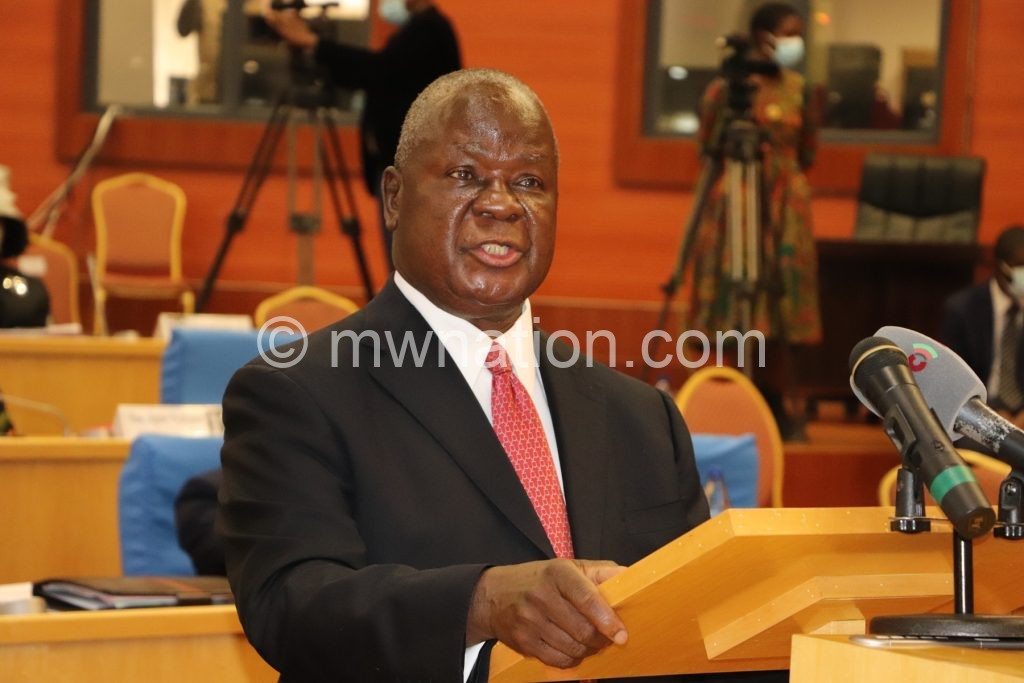Treasury evades budget scrutiny
Parliament will not reconvene to undertake the traditional mid-year review of the performance of the K1.9 trillion 2021/22 National Budget, raising fears of lack of transparency and accountability for public funds.
In an interview yesterday, Treasury spokesperson Williams Banda said the current financial year is short, lasting nine months to transition the government fiscal year to April to March instead of the July to June cycle.

“This is a short financial year and the current meeting of Parliament is not for Mid-Year Budget Review,” he said.
Given that the budget officially rolled-out on July 1 and will expire on March 31 2022, November marks the mid-year for the abridged fiscal year.
When contacted to give a picture of the Mid-Year Budget Review Meeting, Parliament spokesperson Ian Mwenye yesterday referred the issue to Capital Hill.
He said: “This is an ordinary meeting and previously we used to conduct mid-year budget review in February, but for this financial year, I do not know what government will do. They are better placed to explain.”
Reacting to the arrangement in separate interviews, economic and governance experts expressed fear that skipping the exercise could lead to wastage of public resources as some budgeted funds would go unaccounted for.
In a telephone interview from Zomba yesterday, Gowokani Chijere-Chirwa, who teaches economics at the University of Malawi, described the budget review meetings as a critical tool for policing public expenditure in the country.
He said: “The first step of swindling public money is to remove policing. The mid-term review exercise is a police that tells us where we are coming from and where we are heading.
“Some people will remove that so that unsuspecting Malawians should not realise by the time things have worsened. In this instance, the opposition should find a way to make sure they push the minister to tell us. It can be via a press statement or in a newspaper publication.”
In another interview, Lilongwe University of Agriculture and Natural Resources head of agricultural economics and applied sciences Ken Machila yesterday said it was imperative for members of Parliament to find ways of reviewing the 2021/22 National Budget performance. He said the review is the best way to ascertain all weak and strong areas of the financial plan.
In the absence of the budget scrutiny by the legislators, he said there could be a lot of unaccounted for spending of public money.
From a health perspective, health rights activist Maziko Matemba yesterday said Mid-Year Budget Review sessions help in reflecting on the implementation of the whole national budget, stressing that it gives every citizen and policy maker an opportunity to see those areas where the budget is performing well and where the budget is constrained.
He said the 2021/22 budget has no provision for Covid-19 and yet the pandemic is not out of space. He said drawing lessons from the past experience, Covid-19 third wave came during the onset of the rainy season in January 2020.
“So, we needed to take such reflections on board during the mid-year review,” Matemba said.
Budget and Finance Committee of Parliament chairperson Gladys Ganda was not immediately available for comment yesterday.
Despite the review not being legally binding, Parliament has over the years been conducting Mid-Year Budget Review Meetings to assess the performance of the financial plan. The review has offered the Ministry of Finance an opportunity to patch up some expenditure lines and check red flags on overspending budgets.
In the current 2021/22 fiscal year, government’s main focus is to implement economic policies and programmes that will put the country on track to attain the nation’s aspirations as prescribed in the Malawi 2063 President Lazarus Chakwera launched in January this year.
In the budget, government insists on entrenching macroeconomic stability; enhancing the country’s resilience to external shocks, while also fast-tracking economic recovery during the post Covid-19 pandemic period.
However, at the height of implementing the budget, Capital Hill finds itself wobbling as revenue keeps on falling short of expenditure, creating perpetual and historical fiscal deficits, on monthly basis.
As if that is not enough, Minister of Finance Felix Mlusu’s earlier assumptions underpinning the budget seem to be in disarray and off course.
The public purse keeper had envisaged an average inflation rate of 7.4 percent during the fiscal year as well as a stable exchange rate of about K780 per United States dollar. But with the Reserve Bank of Malawi (RBM) revising upwards its 2021 annual average inflation rate to 9.1 percent from an earlier annual inflation target of 8.9 percent, coupled with the continued depreciation of the local currency against other major global currencies, already that is a headache to Mlusu as the financial year draws near to its cut-off point of implementation.
Total revenue and grants for the nine months of the 2021/2022 fiscal year are estimated at K1.271 trillion, representing 12.4 percent of gross domestic product (GDP).
Total expenditure, on one hand, was programmed at K1.990 trillion, representing 19.4 percent of GDP and comprising K1.419 trillion and K570.8 billion development expenditure.





